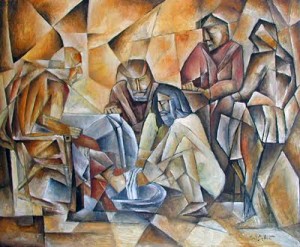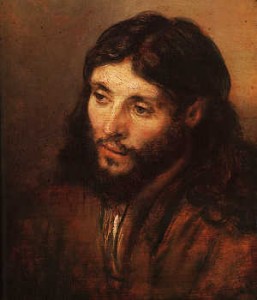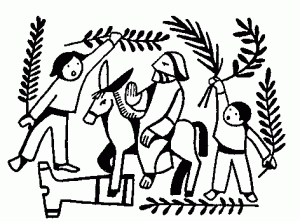Revised Common Lectionary for Maundy Thursday, Year B: Exodus 12:1-14; Psalm 116:1,10-17; 1 Corinthians 11:23-26; John 13:1-17, 31b-35
Redemption is a drama in three acts – three acts and a brief intermission – tonight we take part in Act One.
Act One, Scene One: The curtain rises. We see a group of people gathered in an upper room somewhere in Jerusalem.
 A meal is in progress… Is it a seder, the ritual meal of remembrance of the Passover? We don’t really know; the playwrights have not made this clear; the theater critics, the scholars debate this issue. Three of the story-tellers suggest that it is but the fourth, John, tells the tale very differently. (The synoptic gospels tell the story in a similar way and, if truth be told, in the same way – Luke and Matthew based their stories on Mark’s, so to be honest there aren’t three stories, there’s only one that would make us think that this supper is a seder, but John doesn’t. In fact, John doesn’t even care about that – he spends no time at all describing the meal, for him the important thing is what happened afterward, and that comes in a later scene. So as we begin this three-day, three-act drama of redemption, since we have heard Luke’s voice narrating the story, let’s just assume that what we see in this first scene of the first act is, indeed, a seder.)
A meal is in progress… Is it a seder, the ritual meal of remembrance of the Passover? We don’t really know; the playwrights have not made this clear; the theater critics, the scholars debate this issue. Three of the story-tellers suggest that it is but the fourth, John, tells the tale very differently. (The synoptic gospels tell the story in a similar way and, if truth be told, in the same way – Luke and Matthew based their stories on Mark’s, so to be honest there aren’t three stories, there’s only one that would make us think that this supper is a seder, but John doesn’t. In fact, John doesn’t even care about that – he spends no time at all describing the meal, for him the important thing is what happened afterward, and that comes in a later scene. So as we begin this three-day, three-act drama of redemption, since we have heard Luke’s voice narrating the story, let’s just assume that what we see in this first scene of the first act is, indeed, a seder.)
Those present are prepared to do all that is laid out in the instructions in the book of Exodus; they have worn their sandals; they carry their staffs; they expect to eat of roasted lamb and unleavened bread and bitter herbs. They anticipate spending the night in remembrance of that which happened generations before in Egypt. If we can imagine that they celebrate as modern Jews celebrate, they expect the youngest among them to ask the questions, beginning with “Why is this night different from all other nights?” They know that the head of the household, their rabbi Jesus, will answer those questions in the prescribed way and tell the story of the Passover.
And when the youngest asks “Why do we eat the broken matzah?” they expect Jesus to answer “This is the bread of our affliction; the unleavened bread of poverty, baked and eaten in haste,” but instead he takes the bread, brakes it and says, “This bread is my body, given for you.”
Can’t you just see them in this scene, reclining in that upper room, those serving the meal coming and going, a breeze blowing through the open windows, following along in their prayer books, the Haggadah … They look up startled, glancing at one another, murmuring to each other, “What is he talking about? That’s not here! That’s not the right answer. Where is he? What page is he on?” But the moment passes, the meal moves on, until at the end he takes up the fourth and final cup of wine, the kiddush cup, which recalls God’s promise, “I will acquire you as a nation; you will be my people and I will be your God.” They expect Jesus to say, “Blessed are you, O Lord our God, sovereign of the universe, creator of the fruit of the vine,” but instead they hear, “This cup is my blood!” “What?! What is he saying???”
It is for Jesus and his disciples one of those fleeting opportunities when, because of the pupils’ confusion or frustration or grasping for understanding, the teacher can pass on to the students new information, new values, new moral understanding, a new behavior, a new skill, a new way of seeing and coping with reality; it is what we have come to call “the teachable moment” and so he teaches, yet again, “Remember! Remember,” he says, “Love one another as I have loved you.”
The curtain falls as Jesus continues to teach; the disciples look mystified.
Act One, Scene Two: The curtain rises again. We see the same group of people gathered in the same upper room somewhere in Jerusalem.
 The meal is over, the dishes have been cleared. The disciples are arguing among themselves about who is the greater among them. Jesus looks frustrated and troubled; the teachable moment has passed and they clearly have not understood! They just haven’t gotten it.
The meal is over, the dishes have been cleared. The disciples are arguing among themselves about who is the greater among them. Jesus looks frustrated and troubled; the teachable moment has passed and they clearly have not understood! They just haven’t gotten it.
“Look,” he says, “the greatest among you must become like the youngest, and the leader like one who serves. For who is greater, the one who is at the table or the one who serves? Is it not the one at the table? But I am among you as one who serves. Here, let me show you what I mean.” Getting up from the table, he takes off his robe, ties a towel around himself, pours water into a basin, and begins to wash and dry the others’ feet. Peter protests, “You will never wash my feet.” Jesus answers, “Peter, if I don’t wash you, you can’t be part of what I’m doing.” So Peter relents, “Well then, not only my feet! Wash my hands and my head, too!”
Peter speaks for us. We don’t get this foot-washing thing, do we? Washing our hands makes more sense to us, as it does to Anglican nun and poet Lucy Nanson who wrote:
Wash my hands on Maundy Thursday
not my feet
My hands peel potatoes, wipe messes from the floor
change dirty nappies, clean the grease from pots and pans
have pointed in anger and pushed away in tears
in years past they’ve smacked a child and raised a fist
fumbled with nervousness, shaken with fear
I’ve wrung them when waiting for news to come
crushed a letter I’d rather forget
covered my mouth when I’ve been caught out
touched forbidden things, childhood memories do not grow dim
These hands have dug gardens, planted seeds
picked fruit and berries, weeded out and pruned trees
found bleeding from the rose’s thorns
dirt and blood mix together
when washed before a cup of tea
Love expressed by them
asks for your respect
in the hand-shake of warm greeting,
the gentle rubbing of a child’s bump
the caressing of a lover, the softness of a baby’s cheek
sounds of music played by them in tunes upon a flute
they’ve held a frightened teenager,
touched a father in his death
where cold skin tells the end of life has come
but not the end of love,
comforted a mother losing agility and health.
With my hands outstretched before you
I stand humbled and in awe
your gentle washing in water, the softness of the towel
symbolizing a cleansing
the servant-hood of Christ.
Wash my hands on Maundy Thursday
and not my feet.
Yes, Peter speaks for us; we would rather our hands be washed. But Jesus insists, he must wash his disciples feet for only in this way does one truly honor and serve another in love, only in this way does one recall whose servant one is. He says to them, “If I, your master and teacher, have washed your feet, you must now wash each other’s feet.” Only in this way can his disciples remember his teaching that what is done for us is also to be done for others.
They don’t get the opportunity, however, for the second scene ends as Jesus becomes visibly agitated and declares, “One of you is going to betray me.”
As the curtain goes down, the disciples are looking puzzled and Judas Iscariot is leaving.
Act One, Scene Three: The curtain rises again. We see a garden and an olive grove just outside of Jerusalem. Jesus is there, accompanied by Peter, James, and John.
 “Stay here,” he tells them, “Stay awake while I go over there to pray.” As they settle themselves, he moves away from them, and collapses in a heap, sobbing: “O God … Father, let this pass!”
“Stay here,” he tells them, “Stay awake while I go over there to pray.” As they settle themselves, he moves away from them, and collapses in a heap, sobbing: “O God … Father, let this pass!”
Three times he returns to find them asleep; three times they rise looking sheepish and embarrassed; twice he tells them again to try to stay awake as he goes away still pleading with God for a way out. “Enough,” he says the third time, “Enough! We’re leaving.”
When they look back on that night, how must they feel? When we look back, how should we feel?
Poet Mary Oliver offers a glimpse in her poem Gethsemane:
The grass never sleeps.
Or the roses.
Nor does the lily have a secret eye that shuts until morning.
Jesus said, wait with me. But the disciples slept.
The cricket has such splendid fringe on its feet,
and it sings, have you noticed, with its whole body,
and heaven knows if it ever sleeps.
Jesus said, wait with me. And maybe the stars did,
maybe the wind wound itself into a silver tree,
and didn’t move, maybe the lake far away,
where once he walked as on a blue pavement,
lay still and waited, wild awake.
Oh the dear bodies, slumped and eye-shut, that could not
keep that vigil, how they must have wept,
so utterly human, knowing this too
must be part of the story.
Yes, this too, our utterly human inability to fully keep company with our Lord, this too must be part of the story when it is told, as we see it unfold in the church’s memory tonight, but for now the stage fills, the garden becomes crowded … Judas returns accompanied by temple guards, and Roman soldiers, and servants of the priests … and are those some of the disciples showing up? The orchard of olives suddenly is filled with angry activity, with scuffling, with fighting, with confusion. Peter calls out, “Lord, should we fight back?” and, without waiting for an answer, draws his sword and cuts off a servant’s ear.
“Stop!” cries Jesus. He reaches out and tenderly touches the servant’s head, healing his wound. He seems sadly confused, “Why have you come to arrest me with swords drawn?” he asks, “I’ve been teaching in the temple all week! You could have taken me any time.” It all seems too much for him. Certainly, it’s too much for us! Again, a poet, Ted Loder, speaks for us:
Sometimes, Lord,
it just seems to be too much:
too much violence, too much fear;
too much of demands and problems;
too much of broken dreams and broken lives;
too much of wars and slums and dying:
too much of greed and squishy fatness
and the sounds of people
devouring each other
and the earth;
too much of stale routines and quarrels,
unpaid bills and dead ends;
too much of words lobbed in to explode
leaving shredded hearts and lacerated souls;
too much of turned-away backs and yellow silence,
red rage and the bitter taste of ashes in my mouth.
Sometimes the very air seems scorched
by threats and rejection and decay
until there is nothing
but to inhale pain
and exhale confusion.
Too much of darkness, Lord,
too much of cruelty
and selfishness
and indifference.
Too much, Lord
too much,
too bloody,
bruising,
brain-washing much.
Or is it too little,
too little of compassion,
too little of courage,
of daring,
of persistence,
[too little] of sacrifice?
Jesus and his captors exit; the disciples, confused and frightened, sneak out behind them. The curtain falls. We are left in darkness….
Let us pray:
Heavenly Father, as we enter again into the mystery of these three most holy days, as we participate once again in this three-act drama of redemption, we ask you to illumine our minds and hearts with the hope and promise of Christ’s passion, death, and resurrection; satisfy our hunger and thirst not for bread and drink alone, but for love, and truth, and justice, and peace; as we share your Son’s Body and Blood, renew us and energize us to be a true community of light amid the darkness of sin and injustice in our world; as Jesus invites us to share at his Table, let us in turn invite our brothers and sisters to the table where all can share the resources of your abundance, where justice and peace reign, and where love transforms souls and societies; as the drama of redemption continues, may life conquer death, may light shine in the darkness, and may courage and compassion grow from sacrifice; in Christ’s holy Name we pray. Amen.
 “Let it be so for now.” Acceptance of the status quo, even if only for a little while, is a hard thing for a change agent like John, but some times that’s what has to be done. Some time after this event, Jesus would use the metaphor of a mustard seed to describe the kind of faith that can accomplish great things. (Matthew 17:20; Luke 17:6) It’s a great metaphor because it reminds us of the need to follow the advice he gave here to John: “Let it be.” ~ As any gardner knows (and this is the time of year when gardners are reminded if they’ve forgotten), waiting and accepting the status quo is the essence of planting seeds. After all the fun and anticipation of choosing seeds from a catalog or garden-supply store, after the activity of preparing the soil, after making the hole for your seed, after covering the seed and watering . . . there is the waiting. If one is an impatient type of person, growing things from seeds is not the way to experience instant gratification. The worst thing about growing seeds is waiting for them to grow. But that’s what has to be done: “Let it be.” ~ Depending on what one has planted, the wait may be anywhere from five or ten days or to as much as six or eight weeks to germinate. Until then, you continue to water soil that just sits there looking the same. You hope for sunlight, because sunlight warming the soil is important to growth, but there’s not much you can do about that. So you water and you wait. It’s what has to be done: “Let it be.” ~ If a change agent like John can be patient, can make a small change and then accept the status quo for a little while, great changes can be wrought. Jesus used the seed metaphor another time. He said, “Very truly, I tell you, unless a grain of wheat falls into the earth and dies, it remains just a single grain; but if it dies, it bears much fruit.” (John 12:24) ~ Small change . . . patience . . . great change. “Let it be so for now.” And you may just hear the voice of God saying, “I am well pleased.”
“Let it be so for now.” Acceptance of the status quo, even if only for a little while, is a hard thing for a change agent like John, but some times that’s what has to be done. Some time after this event, Jesus would use the metaphor of a mustard seed to describe the kind of faith that can accomplish great things. (Matthew 17:20; Luke 17:6) It’s a great metaphor because it reminds us of the need to follow the advice he gave here to John: “Let it be.” ~ As any gardner knows (and this is the time of year when gardners are reminded if they’ve forgotten), waiting and accepting the status quo is the essence of planting seeds. After all the fun and anticipation of choosing seeds from a catalog or garden-supply store, after the activity of preparing the soil, after making the hole for your seed, after covering the seed and watering . . . there is the waiting. If one is an impatient type of person, growing things from seeds is not the way to experience instant gratification. The worst thing about growing seeds is waiting for them to grow. But that’s what has to be done: “Let it be.” ~ Depending on what one has planted, the wait may be anywhere from five or ten days or to as much as six or eight weeks to germinate. Until then, you continue to water soil that just sits there looking the same. You hope for sunlight, because sunlight warming the soil is important to growth, but there’s not much you can do about that. So you water and you wait. It’s what has to be done: “Let it be.” ~ If a change agent like John can be patient, can make a small change and then accept the status quo for a little while, great changes can be wrought. Jesus used the seed metaphor another time. He said, “Very truly, I tell you, unless a grain of wheat falls into the earth and dies, it remains just a single grain; but if it dies, it bears much fruit.” (John 12:24) ~ Small change . . . patience . . . great change. “Let it be so for now.” And you may just hear the voice of God saying, “I am well pleased.” “A little while, and you will no longer see me, and again a little while, and you will see me.” Say, what? I have to admit that I have the same reaction to what Jesus says here that the disciples seem to have – a sort of scratching of the head and wondering, “What the heck does that mean?” ~ On the other hand, when I read that statement what immediately comes to mind is that traveling carnival arcade game “Whack-a-Mole” – the one where the rodent pops up unexpectedly from holes and you’re supposed to hit it with a mallet! Undoubtedly, someone will tell me that I’m being blasphemous or sacrilegious or something, but the image that comes to my mind is that game with Jesus popping up out of the holes – “Now you see me. Now you don’t. A little while . . . you’ll see me again. Try to get me!” ~ And truly, that is the way Jesus sometimes “pops up” in my life. I see Jesus in the hungry who come to my church’s food pantry on Saturday mornings and in the volunteers who serve them, but then sometimes on Sunday I wonder where he is: “He was here yesterday. Why isn’t he here now?” Or sometimes, I do see him on Sunday morning in the wonder and glory of worship and in the fellowship among parishioners during coffee hour, but then on Monday I see folks I know driving less-than-courteously in what my daughter calls “gas guzzling SUVs” (confession: I drive one, too) and I wonder: “Where’s Jesus?” He pops up, I see him, he disappears, I don’t see him, a little while . . . there he is again. Like that darned rodent popping up in the game! ~ I know full and well that this is not what Jesus was talking about to the disciples. I know he’s talking about his crucifixion and his resurrection and his ascension; I know that . . . but I still see that “Whack-a-Mole” game in my mind’s eye! That’s one of the beauties of Scripture, that we can find applications of the text in situations that may not be exactly what the original story was about, but that are nonetheless related and valid. Jesus may have been talking about his immediate return in the resurrection, but he also returns in his community through the ages. The original disciples didn’t see him and then they did; church members today are still seeing him in many places and contexts. Sometimes we don’t, but then in a little while, we do. ~ I’m terrible at “Whack-a-Mole”, by the way. I have lousy reaction times with such things, always have – it’s why I was terrible at sports like baseball or tennis in elementary, junior high, and high schools. But I was good at shooting guns. I went to a military high school where we were required to pass Army ROTC firearms tests. I qualified as either a “marksman” or an “expert” with every weapon on which we trained. I was also pretty good at archery. Did you know that the New Testament word for “sin” comes from the sport of archery? It’s hamartia, which means “missing the mark”. Aristotle (384-322 BC) borrowed the term and used it in his Poetics to describe the “fatal flaw” in the hero of a dramatic tragedy; the writers of the New Testament then used it to mean “sin”. ~ So, sometimes I don’t see Jesus when I ought to. It’s not that Jesus isn’t there; it’s just that I don’t see him or if I do, like not reacting to the mole fast enough, I don’t recognize him. Like playing “Whack-a-Mole” and failing to hit the rodent, my reaction timing is just not right and I “miss the mark”. I sin by failing to “whack” when Jesus pops up! Therein lies the spiritual discipline to which this text calls me – to look, to recognize, to hone my reaction time, to respond quickly and affirmatively, and (if you’ll pardon some really blatant sacrilege) to Whack-a-Jesus!
“A little while, and you will no longer see me, and again a little while, and you will see me.” Say, what? I have to admit that I have the same reaction to what Jesus says here that the disciples seem to have – a sort of scratching of the head and wondering, “What the heck does that mean?” ~ On the other hand, when I read that statement what immediately comes to mind is that traveling carnival arcade game “Whack-a-Mole” – the one where the rodent pops up unexpectedly from holes and you’re supposed to hit it with a mallet! Undoubtedly, someone will tell me that I’m being blasphemous or sacrilegious or something, but the image that comes to my mind is that game with Jesus popping up out of the holes – “Now you see me. Now you don’t. A little while . . . you’ll see me again. Try to get me!” ~ And truly, that is the way Jesus sometimes “pops up” in my life. I see Jesus in the hungry who come to my church’s food pantry on Saturday mornings and in the volunteers who serve them, but then sometimes on Sunday I wonder where he is: “He was here yesterday. Why isn’t he here now?” Or sometimes, I do see him on Sunday morning in the wonder and glory of worship and in the fellowship among parishioners during coffee hour, but then on Monday I see folks I know driving less-than-courteously in what my daughter calls “gas guzzling SUVs” (confession: I drive one, too) and I wonder: “Where’s Jesus?” He pops up, I see him, he disappears, I don’t see him, a little while . . . there he is again. Like that darned rodent popping up in the game! ~ I know full and well that this is not what Jesus was talking about to the disciples. I know he’s talking about his crucifixion and his resurrection and his ascension; I know that . . . but I still see that “Whack-a-Mole” game in my mind’s eye! That’s one of the beauties of Scripture, that we can find applications of the text in situations that may not be exactly what the original story was about, but that are nonetheless related and valid. Jesus may have been talking about his immediate return in the resurrection, but he also returns in his community through the ages. The original disciples didn’t see him and then they did; church members today are still seeing him in many places and contexts. Sometimes we don’t, but then in a little while, we do. ~ I’m terrible at “Whack-a-Mole”, by the way. I have lousy reaction times with such things, always have – it’s why I was terrible at sports like baseball or tennis in elementary, junior high, and high schools. But I was good at shooting guns. I went to a military high school where we were required to pass Army ROTC firearms tests. I qualified as either a “marksman” or an “expert” with every weapon on which we trained. I was also pretty good at archery. Did you know that the New Testament word for “sin” comes from the sport of archery? It’s hamartia, which means “missing the mark”. Aristotle (384-322 BC) borrowed the term and used it in his Poetics to describe the “fatal flaw” in the hero of a dramatic tragedy; the writers of the New Testament then used it to mean “sin”. ~ So, sometimes I don’t see Jesus when I ought to. It’s not that Jesus isn’t there; it’s just that I don’t see him or if I do, like not reacting to the mole fast enough, I don’t recognize him. Like playing “Whack-a-Mole” and failing to hit the rodent, my reaction timing is just not right and I “miss the mark”. I sin by failing to “whack” when Jesus pops up! Therein lies the spiritual discipline to which this text calls me – to look, to recognize, to hone my reaction time, to respond quickly and affirmatively, and (if you’ll pardon some really blatant sacrilege) to Whack-a-Jesus!  The early members of the church were prepared, I think, to be separated from the synagogue, to be cast out from Judaism, and to take the major step of becoming adherents of a new and distinct religion. The church members of the first few centuries were, I think, prepared to be persecuted, killed, martyred. Through their witness and the strength of their faith, the church overcame that separation and that persecution to become the most powerful institution in Western Europe; it was prepared to do that. That was, of course, a mixed blessing and there is a lot of historical debate about and some warranted condemnation of the church’s record as the established religion of empires and kingdoms. However, for 2,000 or so years the church, faced with and prepared for either persecution or power, flourished. ~ What the church was not and still is not prepared for is to be relegated to the sidelines, to be treated with indifference, to be seen as irrelevant to the lives of the people it is charged to reach (I’m thinking “Great Commission” here – Matthew 28:16–20). In other words, the church is not prepared for the contemporary, so-called post-modern world which it, in many ways, has helped to create. A recent book, The Millenials (B&H Books, 2011), claims that 70% of those born between 1980 and 2000 consider the church irrelevant to their lives. Meanwhile,
The early members of the church were prepared, I think, to be separated from the synagogue, to be cast out from Judaism, and to take the major step of becoming adherents of a new and distinct religion. The church members of the first few centuries were, I think, prepared to be persecuted, killed, martyred. Through their witness and the strength of their faith, the church overcame that separation and that persecution to become the most powerful institution in Western Europe; it was prepared to do that. That was, of course, a mixed blessing and there is a lot of historical debate about and some warranted condemnation of the church’s record as the established religion of empires and kingdoms. However, for 2,000 or so years the church, faced with and prepared for either persecution or power, flourished. ~ What the church was not and still is not prepared for is to be relegated to the sidelines, to be treated with indifference, to be seen as irrelevant to the lives of the people it is charged to reach (I’m thinking “Great Commission” here – Matthew 28:16–20). In other words, the church is not prepared for the contemporary, so-called post-modern world which it, in many ways, has helped to create. A recent book, The Millenials (B&H Books, 2011), claims that 70% of those born between 1980 and 2000 consider the church irrelevant to their lives. Meanwhile,  In the beginning he had been tempted by riches, by power, by idolization; all these had been offered in the desert. Now how great the temptation must have been to simply give up! Poet Denise Levertov ponders this allure in her poem Salvator Mundi: Via Crucis
In the beginning he had been tempted by riches, by power, by idolization; all these had been offered in the desert. Now how great the temptation must have been to simply give up! Poet Denise Levertov ponders this allure in her poem Salvator Mundi: Via Crucis In this second act of the drama all that has gone before is recapitulated; all that we saw in yesterday’s first act, the supper in the upper room, the act of servanthood taught there, the agonized prayer in the garden, the willing surrender to unjust authority, and more. Not just yesterday’s first act, but all that has gone before from our first act of defiance in the first garden. Poet Ross Miller reminds us of that bond in his brief verse entitled Tau
In this second act of the drama all that has gone before is recapitulated; all that we saw in yesterday’s first act, the supper in the upper room, the act of servanthood taught there, the agonized prayer in the garden, the willing surrender to unjust authority, and more. Not just yesterday’s first act, but all that has gone before from our first act of defiance in the first garden. Poet Ross Miller reminds us of that bond in his brief verse entitled Tau
 A meal is in progress… Is it a seder, the ritual meal of remembrance of the Passover? We don’t really know; the playwrights have not made this clear; the theater critics, the scholars debate this issue. Three of the story-tellers suggest that it is but the fourth, John, tells the tale very differently. (The synoptic gospels tell the story in a similar way and, if truth be told, in the same way – Luke and Matthew based their stories on Mark’s, so to be honest there aren’t three stories, there’s only one that would make us think that this supper is a seder, but John doesn’t. In fact, John doesn’t even care about that – he spends no time at all describing the meal, for him the important thing is what happened afterward, and that comes in a later scene. So as we begin this three-day, three-act drama of redemption, since we have heard Luke’s voice narrating the story, let’s just assume that what we see in this first scene of the first act is, indeed, a seder.)
A meal is in progress… Is it a seder, the ritual meal of remembrance of the Passover? We don’t really know; the playwrights have not made this clear; the theater critics, the scholars debate this issue. Three of the story-tellers suggest that it is but the fourth, John, tells the tale very differently. (The synoptic gospels tell the story in a similar way and, if truth be told, in the same way – Luke and Matthew based their stories on Mark’s, so to be honest there aren’t three stories, there’s only one that would make us think that this supper is a seder, but John doesn’t. In fact, John doesn’t even care about that – he spends no time at all describing the meal, for him the important thing is what happened afterward, and that comes in a later scene. So as we begin this three-day, three-act drama of redemption, since we have heard Luke’s voice narrating the story, let’s just assume that what we see in this first scene of the first act is, indeed, a seder.) The meal is over, the dishes have been cleared. The disciples are arguing among themselves about who is the greater among them. Jesus looks frustrated and troubled; the teachable moment has passed and they clearly have not understood! They just haven’t gotten it.
The meal is over, the dishes have been cleared. The disciples are arguing among themselves about who is the greater among them. Jesus looks frustrated and troubled; the teachable moment has passed and they clearly have not understood! They just haven’t gotten it. “Stay here,” he tells them, “Stay awake while I go over there to pray.” As they settle themselves, he moves away from them, and collapses in a heap, sobbing: “O God … Father, let this pass!”
“Stay here,” he tells them, “Stay awake while I go over there to pray.” As they settle themselves, he moves away from them, and collapses in a heap, sobbing: “O God … Father, let this pass!”  We have just read the simple, yet dramatic story of our Lord’s Passion as related in Mark’s Gospel. But we began our worship this morning with John’s story of Christ’s triumphal entry into Jerusalem. In the span of a few minutes we covered an entire week at the end of Jesus’ earthly life. Logic and reason cannot really make sense of this, and no ten-minute homiletic exegesis of these texts can help us comprehend the enormity of those events.
We have just read the simple, yet dramatic story of our Lord’s Passion as related in Mark’s Gospel. But we began our worship this morning with John’s story of Christ’s triumphal entry into Jerusalem. In the span of a few minutes we covered an entire week at the end of Jesus’ earthly life. Logic and reason cannot really make sense of this, and no ten-minute homiletic exegesis of these texts can help us comprehend the enormity of those events.  This is the fifth and last Lenten sermon addressing a question posed by a parishioner and, in fact, I will try to answer succinctly two related questions that two parishioners asked. One was “What does the word catholic mean when we say it in the Nicene Creed?” and the other was “What do you (meaning me, Father Funston) mean when you describe the Episcopal Church as being ‘in the Catholic tradition’?” (If you could see the way I have typeset these sermon notes, you would see that I have capitalized the “C” in catholic in the second question, but not in the first. That’s an important point which I will address shortly. But let me start with a basic definition in answer to the first inquiry.
This is the fifth and last Lenten sermon addressing a question posed by a parishioner and, in fact, I will try to answer succinctly two related questions that two parishioners asked. One was “What does the word catholic mean when we say it in the Nicene Creed?” and the other was “What do you (meaning me, Father Funston) mean when you describe the Episcopal Church as being ‘in the Catholic tradition’?” (If you could see the way I have typeset these sermon notes, you would see that I have capitalized the “C” in catholic in the second question, but not in the first. That’s an important point which I will address shortly. But let me start with a basic definition in answer to the first inquiry. The simple answer is that fasting is going without some or all food or drink or both for a defined period of time. An absolute fast is abstinence from all food and liquid for a period of at least one day, sometimes for several days. Other fasts may be only partially restrictive, limiting particular foods or substance. The fast may also be intermittent in nature; for example, Muslims fast during the daylight hours of the month of Ramadan which is intended to teach Muslims patience, spirituality, humility, and submissiveness to God. Fasting as a spiritual practice is common to all major religions. Mahatma Gandhi once noted:
The simple answer is that fasting is going without some or all food or drink or both for a defined period of time. An absolute fast is abstinence from all food and liquid for a period of at least one day, sometimes for several days. Other fasts may be only partially restrictive, limiting particular foods or substance. The fast may also be intermittent in nature; for example, Muslims fast during the daylight hours of the month of Ramadan which is intended to teach Muslims patience, spirituality, humility, and submissiveness to God. Fasting as a spiritual practice is common to all major religions. Mahatma Gandhi once noted:

